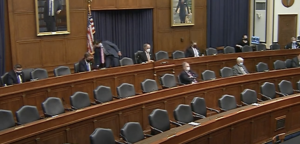In its first hearing of the 117th Congress, the subcommittee invited experts from think tanks to talk about Russia’s and China’s nuclear and space capabilities and how they threaten U.S. and allied national security.
Subcommittee Chairman Rep. Jim Cooper (D-Tenn.) lamented that most of the conversations on this topic are held in classified settings which does not allow for an open debate on U.S. national security priorities and spending.
Advances made by Russia and China in their space and nuclear weapons programs – and how the U.S. should respond to these advances — are discussions usually held in secret, said Cooper. “We should highlight these issues for the public so that the public can be included in the debate.”
Cooper mentioned the Global Positioning System as an example of a space asset that is under threat. The U.S. Air Force developed the GPS that provides a service to the entire world at no cost. “Why would our potential adversaries and even some of our allies spend billions of dollars to copy GPS with their own proprietary versions, and then to develop technologies that could destroy our GPS satellites?” Cooper said. “Friendly neighbors don’t do that.”
The subcommittee’s ranking member Rep. Michael Turner (R-Ohio) mentioned hypersonic missiles, tactical nuclear missiles and anti-satellite weapons as capabilities that China and Russia are advancing and should be of concern to the United States.
“Failing to ensure that we have a credible nuclear deterrent as well as space and counterspace capabilities will have a profound and incalculable impact on our national security and that of our allies,” Turner said.
Todd Harrison, a defense and space analyst at the Center for Strategic and International Studies, said China and Russia are “closing the gap” with the United States in space capabilities. “We have vulnerabilities we are not addressing,” he said.
CSIS this week is expected to release an update to its annual report on global counterspace capabilities. Harrison said the report — titled “Defense Against the Dark Arts in Space” — will recommend that United States improve its ability to monitor space — a discipline known as space domain awareness. He said the U.S. also should develop a diverse and more resilient space architecture of satellites in multiple orbits and technologies to defend satellites from jammers and kinetic attacks.
U.S. Space Command relocation
A new member of the subcommittee, Rep. Doug Lamborn (R-Colo.), asked Harrison to elaborate on previous comments he made criticizing the U.S. Air Force’s decision to recommend the relocation of U.S. Space Command headquarters from Peterson Air Force Base in Colorado to the Redstone Arsenal in Alabama.
“I believe it’s not a wise decision,” said Harrison.
Lamborn has led the fight by the Colorado congressional delegation to get the Pentagon to reverse that recommendation, which they allege was politically motivated.
Harrison said the move should not even have been up for debate. “They should not have engaged in a basing analysis to begin with,” said Harrison.
There is no legitimate reason to move Space Command, he said. “We need stability and continuity for the workforce and the contractors that support Space Command.” He said building a new headquarters in Alabama could cost as much as a billion dollars. The basing decision was an “unforced error,” he said. “The way it was announced, the day before the end of the Trump administration. I think it was unfortunate timing and a distraction for U.S. Space Command.”



